 Petzlover
Petzlover Ojos Azules is originated from Mexico but Japanese Bobtail is originated from Japan. Both Ojos Azules and Japanese Bobtail are having almost same weight. Both Ojos Azules and Japanese Bobtail has same life span. Both Ojos Azules and Japanese Bobtail has same litter size. Both Ojos Azules and Japanese Bobtail requires Low Maintenance.
Ojos Azules is originated from Mexico but Japanese Bobtail is originated from Japan. Both Ojos Azules and Japanese Bobtail are having almost same weight. Both Ojos Azules and Japanese Bobtail has same life span. Both Ojos Azules and Japanese Bobtail has same litter size. Both Ojos Azules and Japanese Bobtail requires Low Maintenance.
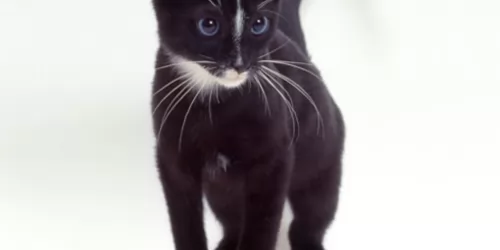 This is a fairly new cat breed that was discovered in New Mexico and its a rare cat. It was in 1984 that the cat was identified.
This is a fairly new cat breed that was discovered in New Mexico and its a rare cat. It was in 1984 that the cat was identified.
There was a feral colony of cats and one particular, a tortoise-shell female was selected to be mated with male cats of no particular description. Her kittens were born with deep-blue eyes, showing that the gene was dominant.
The unusual cat breed was named Ojos Azules which means ‘Blue Eyes’ in Spanish.
The Ojos Azules comes with both short and long hair. The cat was accepted for registration by TICA in 1991.
Only cats with the recognizable deep blue eye gene have been called Ojos Azules.
There was a time when it was discovered that cranial defects could be linked to the gene, and while breeding was temporarily suspended, it is back on track.
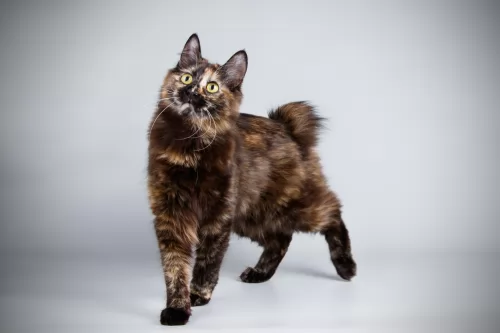 It is believed that these naurally-occuring short-tailed domestic cats in Japan arrived from the Asian continent about 1 000 years ago.
It is believed that these naurally-occuring short-tailed domestic cats in Japan arrived from the Asian continent about 1 000 years ago.
It was way back in 1602 that the Japanese authorities made it that all cats be released to tackle the rodent problem that were threatening the nation's silkworm population.
Bobtail cats were the street cats of Japan. In 1968, the cat was imported to the Western Hemisphere from Japan and in 1976 the shorthaired Japanese Bobtail was accepted for Championship status in the Cat Fanciers’ Association.
There are a number of cat’s breeders in North America and Europe, but it is still a rare cat. Today, the Japanese Bobtail is a recognized breed by all major registering bodies.
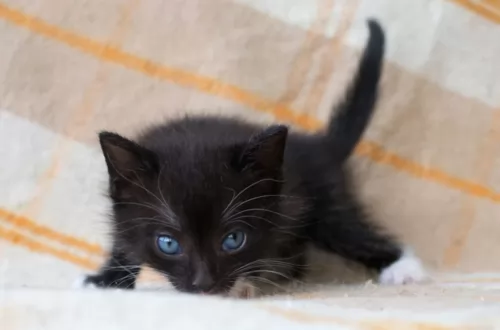 The beautiful Ojos Azules is a medium-sized cat and weighs in at between 3 and 5kg.
The beautiful Ojos Azules is a medium-sized cat and weighs in at between 3 and 5kg.
The cat’s most amazing round blue eyes are one of its most extraordinary features.
The gene in this cat isn’t linked to any particular fur color or pattern, so that means some of these cats will have a black coat but still have the blue eyes. The coat of the cat comes in many colors and is short and silky. Sometimes you’ll find some white markings on the paws and tail.
Not much is known of this cat breed because it is such a rare cat. Very few have owned this cat, but it seems as if, according to the people who have owned them, they are loving, friendly cats.
The small number that have been owned as domestic pets are said to have had balanced, loving temperaments, with the ability to show affection for their human owners.
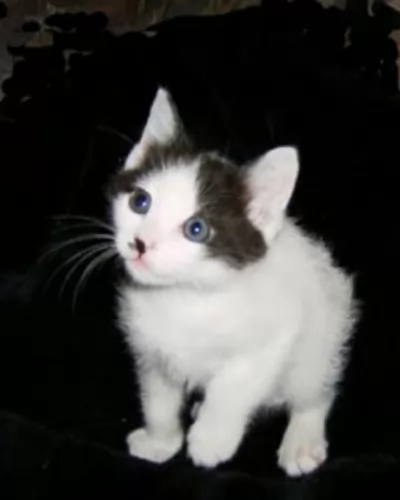 The medium-sized, long, lean and muscled Japanese Bobtail, with long slender legs, is known for its unusual bobtail. People liken the tail to that of a rabbit. The tail must always be visible though.
The medium-sized, long, lean and muscled Japanese Bobtail, with long slender legs, is known for its unusual bobtail. People liken the tail to that of a rabbit. The tail must always be visible though.
The head has a triangular shape and the neck is neither too long or too short. The ears are upright and set wide apart. The oval-shaped eyes are large.
The hind legs are longer than the front legs. The cat weighs between 3 and 6kg and comes in almost any color and pattern but it is thought that the triple-colored ones are the most favored in Japan.
The coat is of medium length and is soft and silky. The head of the cat is triangular with the ears being large and wide apart. The eyes are large and oval-shaped.
The Japanese Bobtail makes a good feline pet for families. They get on well with children and are affectionate and loving with all their human family members.
They’re talkative cats too, enjoying communication with people and using soft noises. It’s an intelligent cat and one that happens to love water too, and is a playful cat, making a great loyal companion.
 The Ojos Azules cat, apart from its amazing eyes, is a regular cat that requires the same devotion from his human family that other cats enjoy.
The Ojos Azules cat, apart from its amazing eyes, is a regular cat that requires the same devotion from his human family that other cats enjoy.
Because this cat is so rare it is unlikely that you have one, but whatever furry feline friend you have, treat it with love and attention. The worst thing humans can do is to buy a pet, become bored with it, and then discard it.
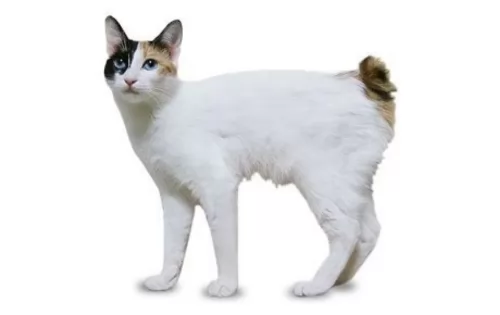 The Japanese Bobtail is such a sweet, playful, loving cat. The cat loves to be with his human family and is highly intelligent.
The Japanese Bobtail is such a sweet, playful, loving cat. The cat loves to be with his human family and is highly intelligent.
They are quite capable of learning tricks and playing games much like a dog. They are social cats and while they aren’t lap cats, they seek out the company of their human family, making use of a soft voice to communicate.
They’re such sweet cats and are adored by those who have brought them into their home as a pet and friend.
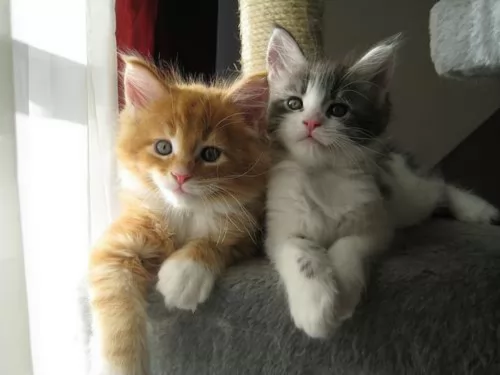 There don’t seem to be too many breed-specific health conditions associated with the Ojos Azules.
There don’t seem to be too many breed-specific health conditions associated with the Ojos Azules.
Having your cat spayed or neutered is beneficial to the cat long-term. Not only that, but it prevents unwanted pregnancies. Thousands of unwanted cats land up in animal shelters or are euthanized every year.
When you bring a new Ojos Azules kitten into the home, you will need to ensure the kitten is vaccinated, but also ensure he is tested for- and free of parasites.
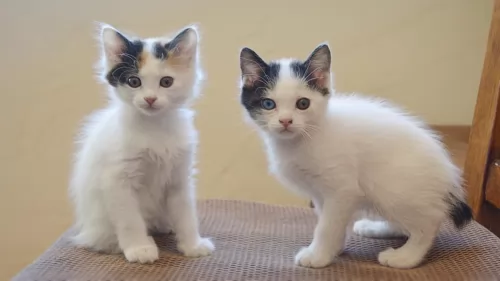 Just like any other cats, the Japanese Bobtail suffers from any one of the different health problems there are. The Japanese Bobtail is a healthy cat generally and he can easily reach 15 years of age with good care.
Just like any other cats, the Japanese Bobtail suffers from any one of the different health problems there are. The Japanese Bobtail is a healthy cat generally and he can easily reach 15 years of age with good care.
Look out for obesity. Obesity comes with a host of health issues, putting a strain on the cat’s joints as well.
You want to manage your furry friend’s food portions to ensure he remains lean and muscular. Feed your adult cat twice daily. Discover what your cat likes in terms of dry cat food, semi-wet or wet cat food.
Your cat is a carnivore and requires quality meaty foods. The best, high-quality cat foods always have meat at the top of the ingredients list as they need meat to get all the right nutrients in.
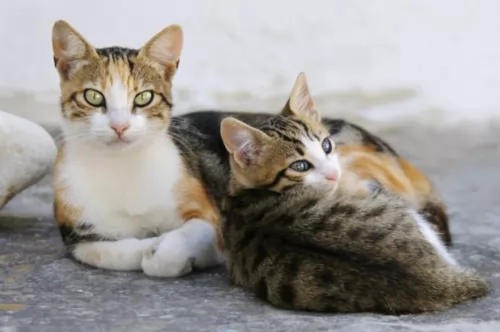 There are no particular requirements when caring for the Ojos Azules. Like other cat breeds, this cat also needs to be loved and well looked after.
There are no particular requirements when caring for the Ojos Azules. Like other cat breeds, this cat also needs to be loved and well looked after.
Contrary to what many people think, a cat isn’t a non-maintenance creature that can look after itself. There are many cat breeds that crave the companionship of their human owners and they need to be looked after carefully.
Ensure the best quality cat foods there are. There are many commercial cat foods and you want the high-quality ones with meat listed as the top ingredient.
A cat is a carnivore and meat is imperative for your cat to be healthy. If you feed your cat one of the commercially manufactured cat foods there are, you’ll find the food comes as dry, semi-moist, and canned.
The food you choose will come down to you and your cat’s preferences. If in any kind of doubt, speak to your local vet for recommendations. Remember, that an old cat, a pregnant cat or an ill cat will require a certain type of food.
You’ll need to coax your cat to use a litter box. The litter box should be in a quiet place where he can do his business in peace. Make sure you have the tools to scoop out your cat’s feces every single day. Cats like a clean litter box.
Provide the cat with a scratching post. If you have a cat as a pet, you must know it will scratch. You can’t change your cat’s behavior but you can do something about it to deter your cat scratching your furniture. You can buy him a scratching post so that he can scratch the way all cats do.
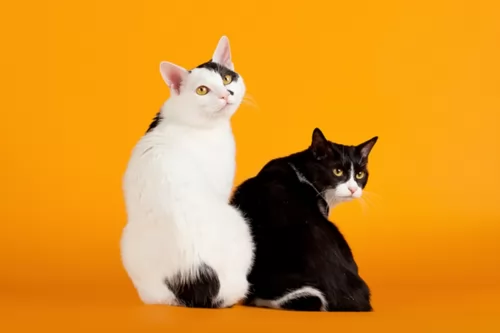 The cat’s medium coat sheds moderately, and a brush once a week to remove the loose hairs will be sufficient. You’ll want to brush him more often during his shedding seasons.
The cat’s medium coat sheds moderately, and a brush once a week to remove the loose hairs will be sufficient. You’ll want to brush him more often during his shedding seasons.
Help with keeping your Japanese Bobtail clean by scooping his droppings out of the litterbox at least every day and also changing the litter at least every week.
When you bring your Japanese Bobtail kitten home, you’ll have to take him to the vet. This is because from 8 weeks of age your kitten will need to get his first vaccines. Booster vaccines for your cat will also be required later on.
Provide your cat with a scratching post to prevent him from scratching your furniture.
Never leave your Japanese Bobtail without a constant supply of fresh, cool water.
Wash your cat’s water- and food bowls every second day to prevent bacteria from building up.